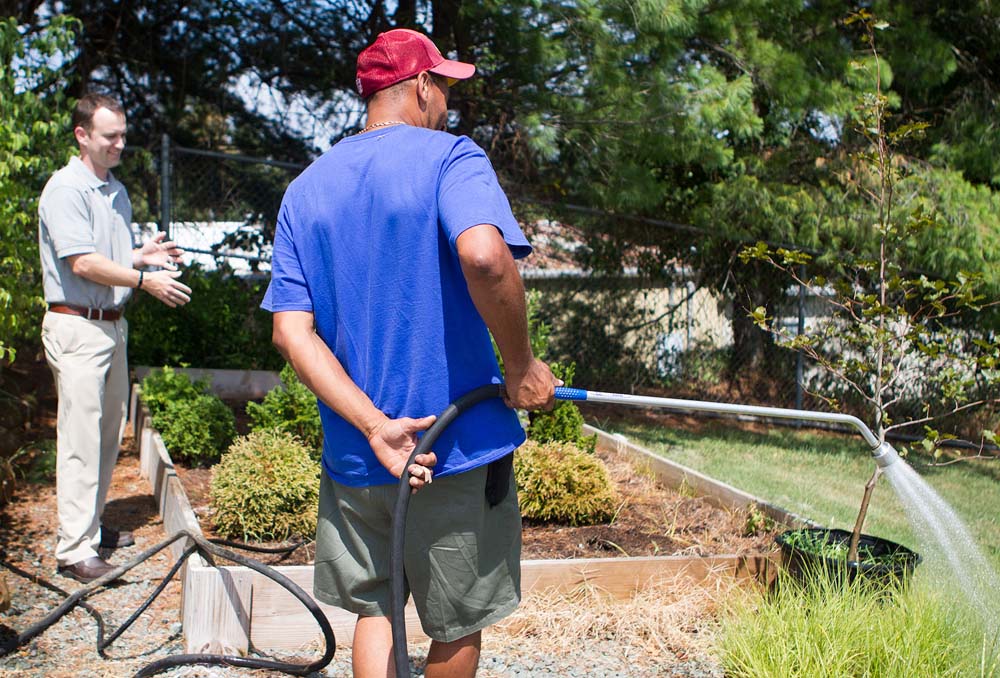Offender Aid and Restoration of Charlottesville-Albemarle, an organization focused on re-integrating ex-felons into society, recently won a $20,000 grant thanks to work this spring by University of Virginia students enrolled in a Frank Batten School of Leadership and Public Policy course.
The students spent the spring semester researching and crafting grant applications for five local nonprofits, including OAR, said Batten professor Christine Mahoney, who led the course. Among the five student-authored grant applications, OAR is the first to be awarded funding. Three others are still awaiting a decision, while one application was rejected.
Bank of America's George J. and Effie L. Seay Foundation awarded OAR $20,000 to expand their Coming Home to Work program, a collaboration with the City of Charlottesville's Parks and Recreation Department, which enables ex-offenders to earn a living wage working for the parks department roughly 25 hours a week over 10 weeks.
OAR provides the ex-offenders, most of whom have little or no employment history, with all the essentials needed for employment, including IDs, transportation, boots and work clothes, said program manager Jason Ness.
As the students explained in their grant application, upon release from incarceration, ex-offenders face daunting barriers to landing and holding a job, often including a lack of "soft skills" like how to appropriately communicate with a supervisor or how to handle a frustrating day at work.
OAR staffers confer daily with the ex-offenders to provide support and guidance on those skills and any other problems that arise over the 10 weeks of employment.
"In this way, CHTW provides a structured re-entry into the local workforce for ex-offenders who need it most," the grant application notes.
After just less than two years of existence, it appears the Coming Home to Work program is working. The program's initial cycle served five people; four of them subsequently landed local jobs. "Having a good reference from the city and from OAR really helps them get a foot in the door," Ness said.
As the students noted on the grant application, in March the city funded the program for a second year with $85,000, up from $30,000 for the first year, demonstrating City Council's satisfaction with the program.
The new $20,000 grant is the first time OAR has ever received funding from Bank of America, Ness said. The OAR staff was "completely impressed" with the students' work, he said, including their thorough research summarized in a report of more than 50 possible grant funding options.
Nine students, who cumulatively had almost zero previous grant-writing experience, worked on this grant application, but they didn't let that lack of experience deter them. "They learned their client's mission, and it became their mission," Mahoney said. "They were creative about finding new, untapped funding sources, tenacious about tracking down foundation program officers to find out what grants were the best fit, and vested in the outcome – realizing this will have an impact on those most in need in our community."
Understanding what OAR does and what the grant application should say "really clicked for the students" when they visited the OAR offices and talked with an OAR client, Ness said.
The ex-offender related his frustrations in trying to find a job, including having submitted dozens of applications and never getting a job interview, and basically said, "I would never have gotten a job if not for this program," explained Nate Daugherty, a student in Batten's master of public policy program class of 2013.
Throughout the semester, the students kept focused on their goal: "To get a grant for OAR so that more ex-offenders can get a second chance and be reintegrated into the community," said Pin-Hsuan "Katy" Lai, who expects to graduate next year from the Batten School's accelerated bachelor/master of public policy program, and this year graduated with her bachelor's degree in commerce and environmental sciences.
Lai is already putting her new grant-writing skills to use on the job. During her current summer internship with the World Wildlife Fund in Washington, she is "constantly brainstorming, researching and preparing grant proposal ideas for corporate donors interested in funding different conservation work."
Mahoney added, "This class gave students an opportunity to work hands-on with a client and learn valuable skills while providing a product that the non-profits desperately need – grant research and writing support. This type of project is a win-win."
Media Contact
Article Information
July 17, 2012
/content/student-project-nets-20000-local-inmate-re-entry-program

